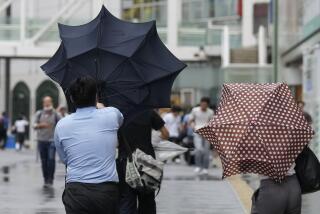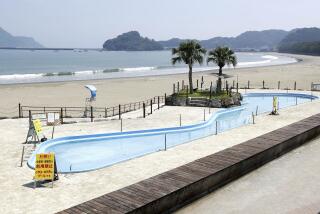Japan imposes limited blackouts to offset power shortage
- Share via
Japanese authorities have begun imposing sporadic power cuts nationwide to make up for production losses and a nuclear power crisis brought on by last week’s devastating earthquake and tsunami.
The rationing in urban areas unaffected by the disasters is necessary, utility officials said, because hospitals in quake-stricken areas have been unable to operate at full capacity to treat those injured in Friday’s magnitude 9.0 temblor and the tsunami that inundated the northeast after the quake.
Makeshift morgues in the hardest hit areas have been unable to make ice or run refrigeration sufficient to prevent sanitation risks from corpses of victims that have washed ashore and pulled from the sodden debris sprawling across Miyagi prefecture, the Kyodo news agency reported.
Rolling blackouts imposed on Tokyo and its vicinity Tuesday forced restaurants to halt hot food service for much of the day and supermarkets deprived of lights, heat and refrigeration closed during the outages.
The power cuts will continue at least until the end of April, officials of the Tokyo Electric Power Co. said. The country relies on nuclear power for 30% of its energy needs, and at least 20% of the nuclear network has been idled by the earthquake either as a precaution or due to damage at the huge Fukushima complex.
While local government and industry managers said they understood the need to spread the disruptions, they criticized the utility for giving them scant notice of the cuts and failing to collaborate with them to determine optimal timing of the cutbacks.
“Confusion is occurring because we’re being informed when, in what areas and how long the blackouts will occur only at the last minute,” complained Masamitsu Sakurai, chairman of the Assn. of Corporate Executives that represents some of Japan’s most important producers and exporters. Sakurai suggested the utility ration power to industry by volume rather than time, allowing each producer to accommodate the reductions as best suits individual needs.
The utility has also been criticized for its handling of the crisis at the Fukushima complex, where three of the six reactors have been rocked by explosions caused by overheating in the core containment chambers. The earthquake and tsunami knocked out power to the cooling systems, triggering a series of breakdowns and missteps that have exposed nuclear fuel rods to the air at one reactor and released dangerous levels of radiation outside the plant.
The power company has agreed to provide enough energy to rail operators to keep Tokyo’s subway system, the world’s busiest with 8 million daily passengers, operating at near-normal capacity after sharply reduced service on Monday paralyzed much of the capital, Kyodo said.
Transport Minister Akihiro Ohata urged factories, businesses and schools to reduce consumption and stagger operating hours to accommodate the power cuts.
Japan is the world’s third-largest economy and the nuclear power generation reductions coupled with soaring prices for oil are expected to result in severe losses in automotive, electronics and machinery production and export.
carol.williams@latimes.com
More to Read
Sign up for Essential California
The most important California stories and recommendations in your inbox every morning.
You may occasionally receive promotional content from the Los Angeles Times.














